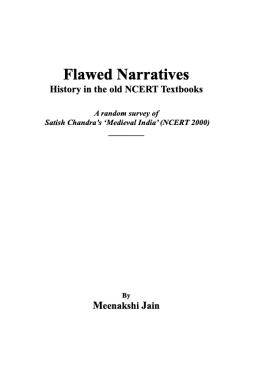TRANQUEBAR PRESS
61 Silverline, 2nd Floor, Alapakkam Main Road, Maduravoyal, Chennai 600095
93, 1st floor, Sham Lal Road, Daryaganj, New Delhi 110002
First published in TRANQUEBAR PRESS by westland ltd 2015
First e-book edition: 2015
Copyright Meenakshi Reddy Madhavan 2015
All rights reserved
10 9 8 7 6 5 4 3 2 1
ISBN: 978-93-85724-51-0
Typeset in Requiem Regular by SRYA, New Delhi
Printed at
The author asserts her moral right to be identified as the author of this work.
This book is sold subject to the condition that it shall not by way of trade or otherwise, be lent, resold, hired out, circulated, and no reproduction in any form, in whole or in part (except for brief quotations in critical articles or reviews) may be made without written permission of the publishers.
the irrepressible memory of silence
It is perhaps fitting that my one big relationship up until now has all the makings of a bad literary novel. Oh, you know the kind I mean. Lots of angst, lots of rain. Arguments late at night. Rooms smelling of clove cigarettes. A whiff of petrichor just as the tide begins to turn. Signs of doom and failure everywhere, which you only notice later.
I first met K at a party my cousin took me to. My cousin, Armana, had been in Delhi for much longer than I had, since college, when she left the stuffy little city in Uttar Pradesh where we both had grown up, our fathersbrothersran a small business which let them build a large house and send their children abroad or away for school. That was how we acquired our non-Jhansi English accents, the rounded lilt of my parents replaced by a flatter, more international tone. Now Armana was married; and very well, to a husband who worked in finance. I imagined him handling great piles of money every day, even though I knew his job had more to do with the laptop he was always hunched over, almost from the minute he was back home and pretty much constantly on the weekends. It had been an arranged marriage, and at the time she was going through the ceremony, I had felt sorry for her in the way the very young feel sympathy for someone making a choice they themselves wouldnt make. Armana and her husband had a four-year-old boy who I babysat sometimes in exchange for her taking me under her wing.
My cousin had always been good-looking, but with her baby she had gained enough weight for people to tell her she had such a pretty face. I personally liked the weight on her. When she was skinny she had looked threatening and calculating. Now her large eyes were framed in an equally large face and her clothes, loose caftan dresses and tights under tunics, suggested the gentle placidness of a manatee.
Armana didnt do much, but she belonged to this mummy and baby club for the wives of men in finance or other such lucrative professions. Everyone was very well connected, and their weekly play dates had all the babies in one room supervised by ayahs, and all the mummies sitting around eating goodies from the latest home baker. No one did anything, but everyone was always very busy. One of the mummies was having the party, and Armana called me. Itll be good for you, she said. Youve just been sitting at home and moping for the last few weeks. Besides, I havent seen you in a while. She liked to make these pronouncements sometimes, sweeping declarations about how I was living my life, and I think at some level, she liked the fact that I was quiet and unsocial, it made her feel like my saviour, and Armana liked to save people.
Actually, I had been planning on seeing her for dinner that week, so this party invitation was probably a way of getting out of meeting me alone. Its not that Armana didnt like me, its just that I hadnt shed all my small-town ways the way she had, and it was harder for her to pretend that she had been born to this south Delhi life, her feet too delicate to handle anything more than a vigorous walk around GK-1
M Block Market.
It was fine by me. I had long since exhausted my supply of polite conversation with her husband, and her little boy, who usually amused me more than his parents did, would have been asleep.
This is Kalyani. She wants to be a writer, Armana told the hosts almost as soon as we walked in. Then she abandoned me in a corner with a glass of wine, while the hostess gave me a smile and wandered off. The hosts had a large apartment in a neighbourhood that was being described as upcoming, which meant that there were still slums nearby, and houses that looked like wobbly tiered wedding cakes, one floor on top of another; but occasionally you found a house like this one, with insides resembling an interior magazine shoot. Lots of traditional Indian stuff everywhere, even a swing set, and I could see by the way the women delicately stepped around the carpet instead of on it, that it was a precious thing, as was probably everything else. I lurked near a large carved door that was propped against a wall. The actual door doors were plain polished wood. The maid offered me some kebabs, and I took one because I had nothing else to do.
I think I spotted him before he spotted me. He clashed with the rest of the room, wearing a faded red kurta and a bristly beard, talking animatedly to two men in skinny chinos and salmon pink shirts. It was Delhis new uniform, the men letting their tailors embrace them almost, high bottoms, shirts unbuttoned for a peek at groomed chest hair or shaved stubble. You could walk into a party now and tell everyone they looked great, men and women both. I might have only noticed him for his contrast to the room, sipping on a glass of whiskey, holding a crumpled napkin in one hand and laughing loudly. He had a gut that you could see through the shape of his kurta, and his hair stood up wildly. Perhaps it only looked wild because the men he was talking to had groomed, coiffed hair, slicked back and hard-looking.
Who are you staring at? asked Armana, walking up to me. Oh, youre looking at K___! Hes the author of that book thats doing so well, whats it called? The Irrepressible Memory of Silence or something. It was The Irrepressible Memory of Silence , a book I had devoured the previous winter and continued to return to for its beauty and simplicity. The book had become an underground successa sleeper hit as they say with moviesuntil a famous Bollywood star mentioned on a talk show that he loved it. That was it. You saw copies of The Irrepressible Memory of Silence everywhere now, at traffic lights, in bookstore windows, and online, where people took their favourite quotes and put the text over a photo of trees or birds. There were even rumours that a producer had asked to buy the rights, but K refused because he didnt have the time to write the script, and he didnt want anyone else to do it. I remembered reading an interview in which he had said, The book is in English. It belongs to the English language. I am happy for it to be translated into other languages in book form, but not as a film. I dont think Ayesha would speak Hindi as a first language, which the movie would make her do. Ayesha was the main character, a troubled girl who collected umbrellas and lived next door to a temple.












